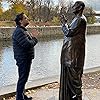Poll
Poll added by: Trevor
Comments Showing 1-14 of 14 (14 new)
date newest »
newest »
 newest »
newest »
Lee wrote: "Big fan of Maxwell. Huge fan of Nabokov. Lolita."
I love Lolita, so I wonder if it's my love for Maxwell or that I tossed in for his book in my post above and my competitive nature kicked in, but your comment makes me think: NO!
I love Lolita, so I wonder if it's my love for Maxwell or that I tossed in for his book in my post above and my competitive nature kicked in, but your comment makes me think: NO!
Those of you voting So Long, See You Tomorrow: I hope you'll say why! Let's see if it can beat an amazing book, or at least tempt others to experience it.
 Trevor wrote: "Those of you voting So Long, See You Tomorrow: I hope you'll say why! "
Trevor wrote: "Those of you voting So Long, See You Tomorrow: I hope you'll say why! "To support you! I know nothing about the book but you're obviously a fan - so I've lent you my vote but await the reason why....
Lolita is one of those books I should re-read - I read it around the time I saw the Kubrick film and the film itself rather put me off.
To elaborate a little on my earlier comment - Maxwell and his book are entirely new to me so I am not backing it without reservations. Lolita is not a book I have read - and although I like Nabokov and understand why he is so widely respected, I am sure he has written many more that I would rather read first. If you had chosen Pale Fire or Pnin I might have voted differently...
Mine is a peculiar strategic vote. The winner of this will almost certainly face The Handmaid's Tale in the next round. I would vote for almost anything against The Handmaid's Tale but I'd feel some sort of creepy guilt if I voted specifically for Lolita against it. Ergo voting to increase the already signficant lead of the Maxwell, a book I know little of, and which I'd have happily seen replaced with something else in the starting list, but one which I would have no qualms backing against Atwood.
As things stand Lolita is going out, but Bernhard had a similar lead at this stage and that one went down to the wire...
 Lolita vs. Handmaid's Tale in round 2 would indeed be a creepyface-off, and something of a tragedy given the casualties that litter the floor of round 1 - One Hundred Years of Solitude (sorry!), Gilead, likely The Tin Drum possibly Satantango.
Lolita vs. Handmaid's Tale in round 2 would indeed be a creepyface-off, and something of a tragedy given the casualties that litter the floor of round 1 - One Hundred Years of Solitude (sorry!), Gilead, likely The Tin Drum possibly Satantango.One might almost suspect someone had fixed this quarter of the draw to ensure that William Maxwell had a strong chance....?
How about a best loser vs. worst winner repechage added at the last 8 stage for each block.
Now Paul, would you put a book you love, one that several people hadn't heard of, against Lolita to, you know, help it along?
I am blown away by the support here, but I'm also surprised to see little support directed specifically at Lolita, a creepy book, perfectly written, that is important for its exploration of the repulsive Humbert Humbert.
I will get on here a bit later to share some more thoughts on Maxwell's gem. I'd like it to have some momentum going against The Handmaid's Tale if it takes out Lolita!
I am blown away by the support here, but I'm also surprised to see little support directed specifically at Lolita, a creepy book, perfectly written, that is important for its exploration of the repulsive Humbert Humbert.
I will get on here a bit later to share some more thoughts on Maxwell's gem. I'd like it to have some momentum going against The Handmaid's Tale if it takes out Lolita!
 Well if I wanted it to have a chance I would put it against Lolita & then The Handmaid's Tale, rather than v any of One Hundred Years of Solitude, Correction, The Tin Drum, Things Fall Apart, Satantango and Remains of the Day - all of which are suspiciously in the other half of the seeded draw!
Well if I wanted it to have a chance I would put it against Lolita & then The Handmaid's Tale, rather than v any of One Hundred Years of Solitude, Correction, The Tin Drum, Things Fall Apart, Satantango and Remains of the Day - all of which are suspiciously in the other half of the seeded draw!
I wrote up the following on So Long, See You Tomorrow a while back. I'm not nearly articulate enough to express how much this books means to me and how exceptionally well executed it is.
Besides me, though, recently Backlisted Podcast did a show on So Long, See You Tomorrow wherein they eloquently chat about how great this book is.
But for now, here's my inadequate review:
Here we have a guilty mind attempting to construct a fictional narrative of the past in order to explore his guilt and get some closure:
The story begins by telling the bare-bone facts about the murder of a tenant farmer. We know little else about what happened other than that a tenant farmer went out one morning to milk the cows and was shot. He was discovered by his son — the children are central to the themes but on the periphery of the narrative. The narrator was a young child at the time, no more than a handful of years old. His own life had been in some upheaval because of his mother’s death during the birth of his younger brother, his father’s subsequent remarriage, and his move into town to a newly constructed house. The construction of this house is an important motif in the story. In its description, the narrator introduces his faulty memory and the idea of story building.
During this trying time of his youth, the narrator befriended Cletus, the son of the soon-to-be murderer. “Befriended” might be the wrong word, though, because really they simply played together due to convenience, silent to all the trouble going on around them.
The heart of the book is what follows — the narrator’s reconstruction of the years before the murder and what it must have been like in the two households involved, all of this to sooth his mind. Maxwell’s prose is sparse and beautifully direct. So silently does the story progress that the moments of violence are audible to the reader and reverberate in the later pages though silence returns. Maxwell lets you know from the get-go that this is an exercise in metafiction; despite the foreknowledge, this one is a powerful fiction riddled with guilt and deep childhood pain.
Besides me, though, recently Backlisted Podcast did a show on So Long, See You Tomorrow wherein they eloquently chat about how great this book is.
But for now, here's my inadequate review:
Here we have a guilty mind attempting to construct a fictional narrative of the past in order to explore his guilt and get some closure:
I very much doubt that I would have remembered for more than fifty years the murder of a tenant farmer I never laid eyes on if (1) the murderer hadn’t been the father of somebody I knew, and (2) I hadn’t later on done something I was ashamed of afterward. This memoir — if that’s the right name for it — is a roundabout, futile way of making amends.
The story begins by telling the bare-bone facts about the murder of a tenant farmer. We know little else about what happened other than that a tenant farmer went out one morning to milk the cows and was shot. He was discovered by his son — the children are central to the themes but on the periphery of the narrative. The narrator was a young child at the time, no more than a handful of years old. His own life had been in some upheaval because of his mother’s death during the birth of his younger brother, his father’s subsequent remarriage, and his move into town to a newly constructed house. The construction of this house is an important motif in the story. In its description, the narrator introduces his faulty memory and the idea of story building.
I seem to remember that I went to the new house one winter day and saw snow descending through the attic to the upstairs bedroom. It could also be that I never did any such thing, for I am fairly certain that in a snapshot album I lost track of there was a picture of the house taken in the circumstances I have just described, and it is possible that I am remembering that rather than an actual experience. What we, or at any rate what I, refer to confidently as memory — meaning a moment, a scene, a fact that has been subjected to a fixative and thereby rescued from oblivion — is really a form of storytelling that goes on continually in the mind and often changes in the telling. Too many conflicting emotional interests are involved for life ever to be wholly acceptable, and possibly it is the work of the storytelling to rearrange things so that they conform to this end. In any case, in talking about the past we lie with every breath we draw.
During this trying time of his youth, the narrator befriended Cletus, the son of the soon-to-be murderer. “Befriended” might be the wrong word, though, because really they simply played together due to convenience, silent to all the trouble going on around them.
My father represented authority, which meant — to me — that he could not also represent understanding. And because there was an element of cruelty in my older brother’s teasing (as, of course, there is in all teasing) I didn’t trust him, though I perfectly well could have, about larger matters. Anyway, I didn’t tell Cletus about my shipwreck, as we sat looking down on the whole neighborhood, and he didn’t tell me about his. When the look of the sky informed us that it was getting along toward suppertime, we climbed down and said “So long” and “See you tomorrow,” and went our separate ways in the dusk. And one evening this casual parting turned out to be for the last time. We were separated by that pistol shot.
The heart of the book is what follows — the narrator’s reconstruction of the years before the murder and what it must have been like in the two households involved, all of this to sooth his mind. Maxwell’s prose is sparse and beautifully direct. So silently does the story progress that the moments of violence are audible to the reader and reverberate in the later pages though silence returns. Maxwell lets you know from the get-go that this is an exercise in metafiction; despite the foreknowledge, this one is a powerful fiction riddled with guilt and deep childhood pain.
Boys are, from time to time, found hanging from a rafter or killed by a shotgun believed to have gone off accidentally. The wonder is it happens so seldom.






























Still, I have extreme reverence for So Long, See You Tomorrow. It's beautiful and one of the most meaningful books in my life. It's the reason I don't really like Atonement, because Maxwell does everything McEwan does without the tricks. I have a feeling I'm going to have to work hard to get it to make a solid showing here, and I'm looking forward to doing that!